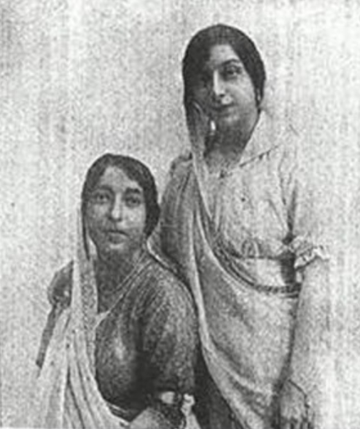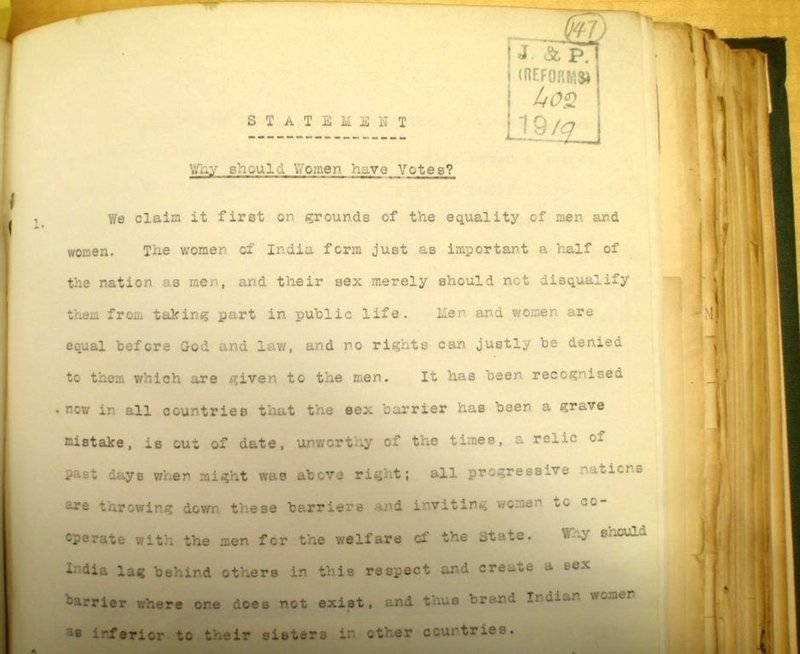
Herabai Tata
Indian suffrage activist who campaigned across Britain in 1919
Other names
Mrs H. A. Tata
Place of birth
Date of arrival to Britain
Location(s)
London
WC1H 9BQ
United Kingdom
Date of time spent in Britain
1919–23
About
Herabai Tata was born in 1879 in Bombay. At 16 she married into the Tata family and gave birth to her daughter, Mithan, a year later. In 1909, Herabai became a Theosophist and would often attend Theosophical conventions in Adyar and Benaras, through which she met Annie Besant. In 1911, on a holiday in Kashmir, Tata met Princess Sophia Duleep Singh. Through discussion with Sophia and literature that Sophia later sent, Herabai became interested in and an active worker for the cause of women's suffrage.
In 1915 Tata became Honorary Secretary of the Women's Indian Association (WIA) in Bombay. She was involved in promoting women's rights to the Montagu investigation in 1916 and then to the Southborough Franchise Committee. On 2 August 1919 Tata went to England with Mithan and Sir Sankaran Nair in order to present a memorandum on women's franchise to the Joint Select Committee. Over the last quarter of 1919, Tata met with a large range of women's organizations in Britain championing women's right to vote in India. Although the 1919 Government of India Act did not enfranchise women, it did allow a concession for Indian provinces to determine their own franchise qualifications. Following Herabai Tata's campaigning, Bombay granted women a limited franchise in 1921.
In 1919, in England, Mithan received a place on a postgraduate course at the London School of Economics and so Herabai stayed on in England for the next four years while her daughter completed her studies. During that time, Herabai also registered as a student at LSE and took classes in economics, but she did not sit any exams. They stayed at 16 Tavistock Square in London from November 1919 to March 1920. Herabai Tata returned to India with her daughter in 1923.
Annie Besant, Madame Cama, Margaret Cousins, Dorothy Jinarajadasa, Mithan Lam, Sarojini Naidu, Sankaran Nair, Sophia Duleep Singh.
'A Short Sketch of Indian Women's Franchise Work' (n.d.), in Eunice de Souza and Lindsay Pereira (eds) Women's Voices: Selections from Nineteenth and Early-Twentieth Century Indian Writing in English (Delhi: Oxford University Press, 2002), pp. 127–34
Forbes, Geraldine, Women in Modern India (Cambridge: Cambridge University Press, 1998)
Mukherjee, Sumita, 'Herabai Tata and Sophia Duleep Singh: Suffragette Resistances for India and Britain, 1910–1920', in Rehana Ahmed and Sumita Mukherjee (eds) South Asian Resistances in Britain 1858–1947 (London: Continuum, 2012), pp. 106–21
Mukherjee, Sumita, Indian Suffragettes: Female Identities and Transnational Networks (New Delhi: Oxford University Press, 2018)
Mukherjee, Sumita, 'Tata [married name Lam], Mithan Ardeshir [Mithibai] (1898–1981)', Oxford Dictionary of National Biography (Oxford University Press, 2018) [https://doi.org/10.1093/odnb/9780198614128.013.111939]
IOR/L/PJ/9/8, File 267/19, Representations etc relating to Franchise for Women in India under the Reforms Scheme (1918–1919), Asian and African Studies Reading Room, British Library, St Pancras
Correspondence with Mrs Jaiji Petit, Head of Bombay Women's Suffrage Union, 1919–1920, Nehru Memorial Library Archives, New Delhi
The Vote (1919)

‘Why Should Women Have Votes?’, sent to the India Office on 25 September 1919, IOR/L/PJ/9/8, File 267/19, Representations etc relating to Franchise for Women in India under the Reforms Scheme (1918-1919), Asian and African Studies Reading Room, British Library, St Pancras: Public Domain
Image credit
By unknown author – International Woman Suffrage News (7 November 1919), p. 18
Public domain, via Wikimedia Commons, https://commons.wikimedia.org/w/index.php?curid=84330168
